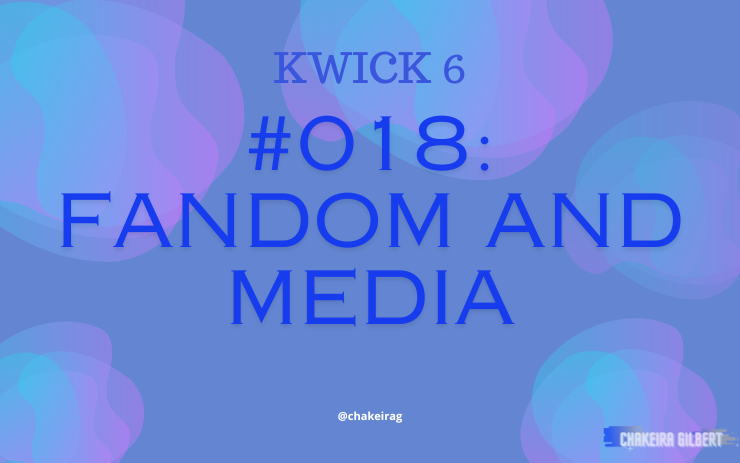KWICK 6 #018: Fandom and Media

🤔 Thought of the Week:
March Madness is over, and I believe it was a success. The championship game brought in 18.87 million viewers, which is a record for women's basketball and the highest-viewed basketball game in five years. The Final Four averaged 7.17 million and 14.42 million viewers, the latter being a record-breaking viewership until the championship game. Will the 18.87 or 14.42 million be the standard for games? No. I don't think so. I believe the 7 million is a more accurate expectation of tournament viewership. Basketball viewership across the board is pretty low during the season, while championships always bring in more viewership. So, while the Clark effect won't shape out to consistently be the 18 million, I do think there will be a bump in viewership because there are new fans. The WNBA will benefit from this rise as well. The WNBA has seen an uptick in viewership over the past couple years, so it will be interesting to see what results Clark's first year will have on the W.
With all this said, watching this tournament's media coverage was fascinating. As I stated in the last KWICK 6, on ESPN (outside of the Andraya, Chiney, and Elle analysis) the storyline revolved around Clark. I understand she is the draw, but I think it created a hole for next year. To me, there are three types of basketball fans: 1) the lover, 2) the casual, and 3) the school fan. The lover is someone who just watches basketball. Doesn't matter gender or age. They just love watching the game being played, especially when it is being played well. The casual is most likely a sports fan. They may have a favorite player and watch games inconsistently during the season or basketball isn't their favorite so they watch other sports religiously. However, they are tuned in for the playoffs or March Madness. This person usually doesn't know in depth history of the game but can talk intelligently about it. The school fan is just that. They follow a school and have been a fan of that school for years (or a year for some fans). They usually don't follow the players as they enter the pros but will watch some of their favorites sporadically.
All fandom can be a mix of two of the three, but I think which lane you fall in affects the type of storylines you need to see to stay interested. The lover wants a variety of storylines and introductions to various teams and players. They like the technical aspect of the game. What defense is being run and why? The casual wants the most popular storyline. Who is the best player, and what are they doing? The school fan wants to know about their team. What are their chances? What made ESPNs coverage interesting to me is they catered to the casual with sprinkles for the lover and the school fan. I understand why. The casuals are the ones who boost the numbers but they are also the hardest to keep engaged throughout a season. It sounds like I am super critical of ESPN's coverage, but they did a better job this year than in past years. They got studio people who were excited about the games and could speak to the x's and o's. They had features on a couple of players with interesting stories. My only complaint is they didn't do a good job building various storylines throughout the season. Maybe next year, and that'll keep all 3 fans happy.
💻 What I've Consumed:
The Expanse
I've recently started watching The Expanse TV series on Prime and enjoy the changes to the show. The show is structured like the book, and I still don't necessarily like following Miller. His point of view is a little boring and doesn't seem to move the story forward much. That could be because he is a detective, so the slowness of his piecing together the mystery can be tedious for viewers. Holden's naivety is captured well. He is idealistic and sees things as black and white, which leads to trouble. The crew's dynamic is interesting in the show. The trauma they experienced together doesn't automatically bring them together, and that's what it seemed like in the book. I like to see the growing trust between them, but I also enjoy seeing the distrust between them. I also enjoy seeing the politicians make moves in what is a changing political landscape. The first book didn't really show that aspect of the world. Overall, I am enjoying season 1 as much as I enjoyed book 1.
3 Body Problem
I am only an episode into this Netflix series and am fascinated. As with most shows and movies, this is an adaptation of a book series. I have not read the book, and usually, I like to read before I watch. However, after doing some research, I decided that because of the complexity of the books, it may be beneficial to watch before I read. It is too early to explain what I like or don't like, but it did do a good job of capturing my attention right away. I am excited to see where the story goes.
The Kim Mulkey Way
This Washington Post story came out the morning of March 30th, the morning of LSU's Sweet 16 matchup with UCLA. I, with so many others, read this piece because Mulkey brought it to the forefront and caused people to talk about it. Honestly, I think this story would have been smaller than it was, but Mulkey brought attention by calling it a "hit piece". The piece was anything but a hit piece. It was actually pretty fair. Like many deep dives into winning coaches, it detailed the ugly side while highlighting how she gets the best out of her players. It made Mulkey more than a flamboyant coach, but a human with struggles that shape how she coaches. I think it was fair. Some discourse questioned whether male coaches would get such a write-up, and my answer is yes. The first coach that came to mind was Bob Knight. Nothing new came out in the article, but it did ask the question of whether her winning at all costs despite the human is beneficial to coaching young women. Interestingly, her style juxtaposes with that of Dawn Staley, another player turned coach. The way former players speak about each coach is telling.
📚 Currently Reading:
I think I am in a reading slump, and this time of year usually brings one. I am slowly reading The Hexologist. I am thinking about starting to read Three Assassins by the same author who wrote Bullet Train. Maybe I need something outside of my usual genres to boost my reading interest. My best friend and I plan to read The Attic Child. To get out of my reading slump, I am going to read for at least 45 minutes per day. Hopefully, that will help.
Last week, on a day when I was mainly doing simple reviews and wills, I listened to The Time Machine by HG Wells. This classic science fiction novel explores the themes of civilization in the future and time travel. I thought I would enjoy it because I have enjoyed reading through the Foundation series by Isaac Asimov. The story follows the Time Traveler as he recounts his adventure 800,000 years in the future. He encounters the Eloi and the Morlocks; these different people symbolize the duality of humanity. I recently watched the 2002 loose adaptation and was curious about the book. There are many differences. The book doesn’t develop the time traveler or any other characters. It doesn’t really detail why he wants to time travel. Also, the characterization of Weena and the interaction with her was kind of weird. I’m not sure what to take from that. Overall, the book was fine. The commentary about evolution was interesting but the story wasn’t really fleshed out. This could be because it is a short story but I have read short stories that have fleshed out ideas and big impacts. I have a hard time recommending the book. Not one I would reread, as there are better classic science fiction out there.
💡 Lessons Learned:
When confronted with undeniable evidence of American brutality, evangelicals could always fall back on the concept of human depravity. With sin lurking in every human heart, violence was inevitable, and only Jesus was the answer.
Jesus and John Wayne by Kristin Kobes Du Mez
There is a lot of death and destruction happening in the world right now. Sometimes, as Christians, it is easy to say that it is just sin in the world and pray about it. For everyone, it is easy to get caught up in daily life and disregard what is happening worldwide. Over the past year, I have learned not to just scroll past the atrocities online but to take the time to learn more about the context and sit with what I feel. It is easy to feel overwhelmed because there is so much pain. I have been asking myself two questions: 1) how can I contribute besides just falling back on Jesus is the answer, and 2) do my actions help people in a tangible way?
If you need some recommendations, check out my Goodreads or StoryGraph. And then follow me on Instagram and Twitter. One of my favorite newsletters to read for current events is Morning Brew. Check it out.
